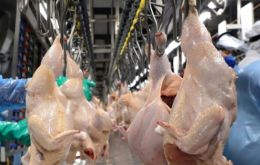MercoPress. South Atlantic News Agency
Agriculture
-
Wednesday, December 10th 2025 - 19:21 UTC
FAO Food Price Index declines in November for third consecutive month

World food commodity prices declined in November, led by lower international quotations for all major staple foods except cereals, according to the benchmark measure released by the Food and Agriculture Organization of the United Nations (FAO).
-
Tuesday, December 9th 2025 - 21:58 UTC
Southern Brazil hit by extratropical cyclone

Heavy rainfall triggered by an extratropical cyclone battering Southern Brazil caused widespread flooding on Tuesday, turning streets into rivers and hillsides into waterfalls across Florianópolis, São José, Palhoça, and Biguaçu.
-
Saturday, December 6th 2025 - 09:51 UTC
Kiwi forestry giant approved for Uruguayan benefits program

New Zealand forestry giant Claymark has received official approval for a major investment in Uruguay, committing over US$100 million to establish large-scale operations in the South American nation.
-
Thursday, December 4th 2025 - 10:07 UTC
Paraguayan meat exports to pierce US$2bn ceiling this year

According to a study by the Paraguayan Meat Chamber (CPC), released on Wednesday in Asunción, the South American country is projected to surpass the US$ 2 billion export ceiling for the first time by the end of 2025. The survey foresaw a total of US$2.169 billion worth of outbound trade.
-
Wednesday, December 3rd 2025 - 11:16 UTC
Brazil clinches export clearances with Philippines, Guatemala, and Nicaragua

Brazilian authorities have completed negotiations with the Philippines, Guatemala, and Nicaragua to expand agricultural exports to these countries after reaching an understanding on sanitary and phytosanitary requirements.
-
Monday, December 1st 2025 - 09:06 UTC
Venezuelan coffee exports grow 500% from 2024

Venezuelan officials have reported a 500% rise in coffee exports this year compared to 2024. The announcement was made during the recent IV International Meeting of Venezuelan Specialty Coffees (Eicev 2025).
-
Saturday, November 29th 2025 - 09:46 UTC
Uruguay approves mass culling of parakeets to save crops

The Uruguayan government, under pressure from the agricultural sector over millions in crop losses, has approved a new emergency plan for the mass culling of parakeets, utilizing controversial methods like toxic baits and adhesives.
-
Saturday, November 22nd 2025 - 09:56 UTC
Chile launches “Cherry Express” to China season

Chile has officially begun its 2025-2026 fresh cherry export season by sea, with the first dedicated “Cherry Express” ships sailing directly from the Port of San Antonio to China this week. The season is heavily reliant on the Asian market, which purchases approximately 93% of all Chilean cherry exports.
-
Thursday, November 20th 2025 - 21:06 UTC
Paraguay finalizes first poultry shipment to Philippines

Paraguay has successfully completed its first-ever export of poultry meat to the Philippines, achieving a significant milestone in its strategy to expand trade with the Asian market. The inaugural shipment took place just two months after the Philippine market was officially opened to the South American country's poultry products, it was reported this week in Asunción.
-
Wednesday, November 19th 2025 - 15:36 UTC
Brazil estimates another record harvest in 2025/26, totaling 354 million tons

Brazil’s 2025/26 grains and oil seed harvest is estimated should reach 354.8 millon tons, representing an 0.8% over the previous record harvest, according to the second survey by the country’s National Supply Company, CONAB, which was completed earlier this month.